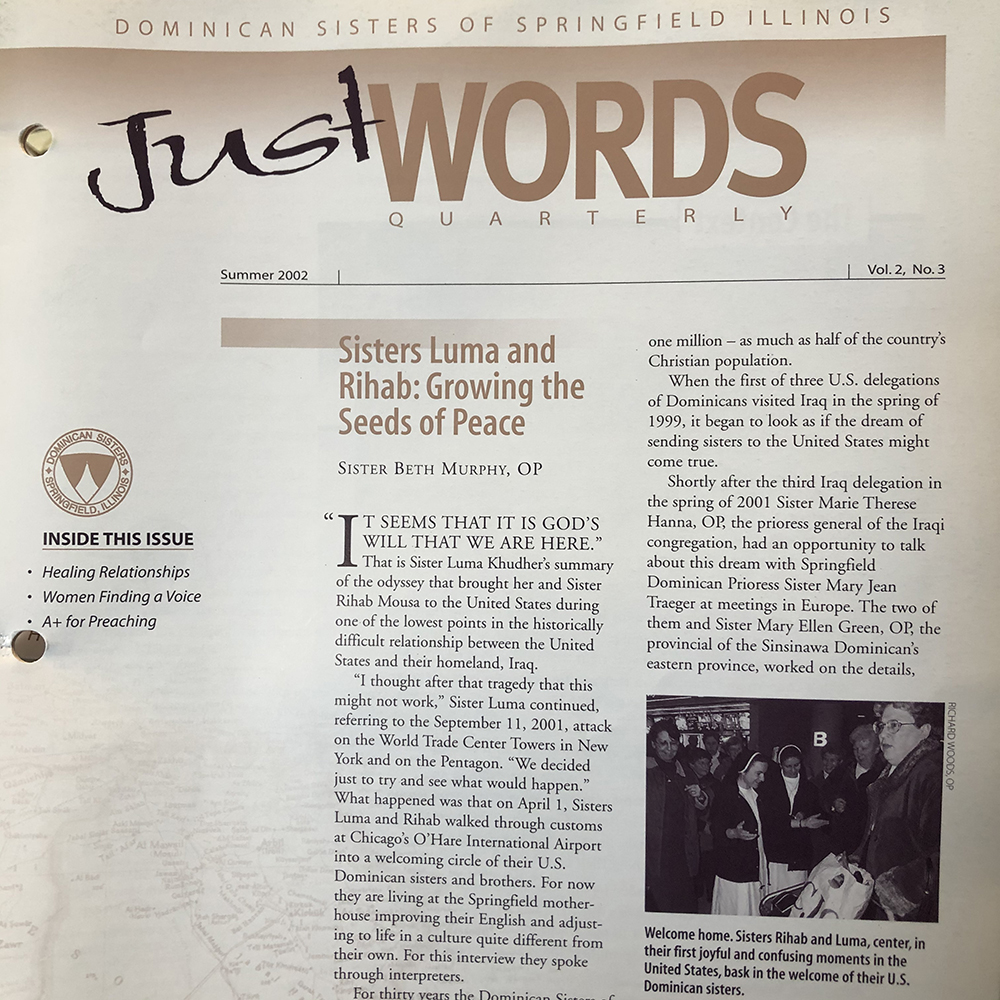
“It seems that it is God’s will that we are here.” That is Sister Luma Khudher’s summary of the odyssey that brought her and Sister Rihab Mousa to the United States during one of the lowest points in the historically difficult relationship between the United States and their homeland, Iraq.
“I thought after that tragedy that this might not work,” Sister Luma continued, referring to the September 11, 2001, attack on the World Trade Center Towers in New York and on the Pentagon. “We decided just to try and see what would happen.” What happened was that on April 1, Sisters Luma and Rihab walked through customs at Chicago’s O’Hare International Airport into a welcoming circle of their U.S. Dominican sisters and brothers. For now, they are living at the Springfield motherhouse improving their English and adjusting to life in a culture quite different from their own. For this interview they spoke through interpreters.
Iraqi diaspora
For thirty years, the Dominican Sisters of St. Catherine of Siena, from the northern Iraq city of Mosul, have dreamed of sending their sisters on mission with other Dominicans around the world. About 30 of the 153 members of the congregation are ministering outside Iraq in Belgium, Italy, Sweden, France, and other places where the ever-growing Iraqi Christian diaspora has settled. Estimates of the number of Iraqi Christians living outside Iraq range up to one million—as much as half of the country’s Christian population.
When the first of three U.S. delegations of Dominicans visited Iraq in the spring of 1999, it began to look as if the dream of sending sisters to the United States might come true.
Shortly after the third Iraq delegation in the spring of 2001, Sister Marie Therese Hanna, OP, the prioress general of the Iraqi congregation, had an opportunity to talk about this dream with Springfield Dominican prioress general Sister Mary Jean Traeger at meetings in Europe. The two of them and Sister Mary Ellen Green, OP, the provincial of the Sinsinawa Dominican’s eastern province, worked on the details, thinking that by September 2001, the Iraqi sisters might be ready to come to the United States.
It would be a difficult task under the best of circumstances. Getting Iraqi passports is not easy. Getting visas to the United States from a country that for eleven years has been under the most severe sanctions regime in the history of the United Nations is even more difficult. Doing so after September 11? Everyone involved questioned whether it would be possible at all.
Remote possibility
Sister Luma recalled what she thought of her chances of actually getting to the United States. “I had an idea that it might happen, but the possibility seemed so remote that I didn’t think much about it,” she said. “Life was very hard in Iraq and the relationship between our two countries seemed too difficult.”
Like many members of their congregation, Sisters Luma and Rihab are from the village of Karakosh, one of the few predominantly Christian cities in Iraq, in the northern province of Nineveh. They plan to stay in the States for at least three years, to learn English and then to minister where they can best use their gifts. Each already has a college degree. Sister Luma is a biologist, and taught biology in Karakosh. Sister Rihab, whose degree is in computer science, worked with the Dominican Friars in Mosul to publish a Christian magazine and produce catechetical videos.
They understand, and welcome, their inevitable role as ambassadors of the Iraqi people to the citizens of the United States, even if it is sometimes difficult. In Iraq they are suspect because as a Christian minority in a Muslim country they are perceived as Westerners. “After the U.S. bombing of Afghanistan sometimes when we would go out on the street people would shout after us and call us ‘Bush’s people,’” Sister Rihab recalls.
"They draw back"
Some Americans are trapped by similar unjust stereotypes. The sisters had the sense before they arrived that in the United States every person from an Arabic country is assumed to be a terrorist. While no one has accused her of terrorism, Sister Luma has experienced what she perceives as fear of the unknown among U.S. citizens. “Even now,” she says, “when I tell people that I am Iraqi I feel them draw back a bit.” After September’s tragedy, Sister Rihab says that she wanted more than ever to come to the United States, “to prove to the people of America that not all Arabs are the same.” While not ethnically Arab—the sisters, like many Iraqi Christians, are of Syrian descent—they refer to themselves as Christian Arab. Those distinctions are not as important to them as the future of Iraqi-U.S. relations.
“The war between our two governments gives me an opportunity to bring and to grow in this country the seeds of peace.” Sister Rihab says. “I want peace.”
“I don’t care as much about peace between our governments, but between our people and your people,” Sister Luma added. “We will take this step by step.” For Sisters Luma and Rihab the next step is not entirely clear. Sister Rihab says she knows when the next step will come, however. “When I dream in English, then I will know that I am ready!” she jokes. “I would like to learn more about computers, and eventually, I would like to use my communication skills to speak out for what is right. I would like to work to speak the truth.” Sister Rihab punctuates her words with the omnipresent Arabic Inshallah— God willing.
First published in JUST Words, Vol. 2, No. 3, Spring 2003.

